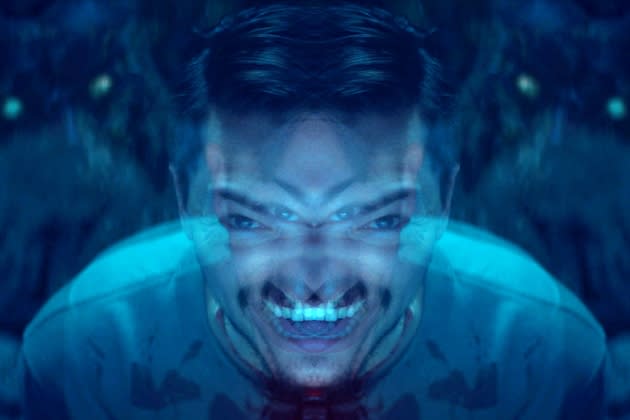‘Hypochondriac’ Review: A Wolf in L.A. Peep’s Clothing

“Hypochondriac” informs viewers right away that it is “based on a real breakdown,” which certainly provides a new wrinkle on the now-wildly-overused “true story” proviso. Nonetheless, clarity of hindsight is not a major virtue in this adventurous first feature by writer-director Addison Heimann.
The offbeat indie drama features Zach Villa as a Los Angelean whose troubled past threatens to unravel his domestic partnership and his very sanity. The combination of gay protagonists, mental illness exploration, horror tropes, and surreal elements that gesture toward “Donnie Darko” make for an ambitious mix that holds attention, even if the uneven, somewhat muddled results are ultimately more effortful than insightful.
More from Variety
'Gone in the Night' Review: Winona Ryder and the Case of the Vanishing Boyfriend
South by Southwest Conference Expanding to Australia in 2023
Quiver Distribution Buys SXSW Horror Favorite 'Bitch Ass' (EXCLUSIVE)
Following a festival tour that includes a midnight berth at SXSW and fitting slot in genre-focused Fantasia, XYZ Films will open the film in limited release on July 29, with digital and VOD release following Aug. 4.
A prologue reminiscent of 1960s/’70s post-“Psycho” chillers — in which Mom was frequently the agent of formative psychological scars — has young Lindo aka Will (Ian Inigo) at the mercy of his unstable mother (Marlene Forte). Beset by paranoid delusions, she drags him from their tony Souther California home to a motel room, where she nearly strangles him to death before regaining sense enough to commit herself to an asylum. He’s left to the care of his coldly distanced father (Chris Doubek).
Eighteen years later, Villa’s now 30-year-old Will is a potter, whatever lingering PTSD issues in sufficient control that he can calm a co-worker’s (Yumarie Morales) anxiety attack, as well as put up with their insufferable gallery-owner boss (Madeline Zima). He’s also got a good thing going with Luke (Devon Graye), the boyfriend of eight months that he’s living with. But the past rears its ugly head when Mom, incommunicado for a decade, begins deluging him with crackpot phone messages and bizarre packages he tries to ignore.
It cannot be coincidental that he soon begins experiencing dizzy spells, disturbing visions, workplace accidents, nausea and more. A line of consulted medical and psychiatric professionals, played in superciliously off-kilter fashion by numerous familiar faces (including Paget Brewster and Adam Busch), assure him it’s nothing to worry about. Yet things get worse, particularly once he makes the baffling decision to take some psychedelic mushrooms Ma had thoughtfully mailed.
That bad trip revives the long-dormant personal specter of a man-wolf with glowing eyes that terrorizes him, even as it becomes obvious it’s no “real” supernatural menace but a figment of his tormented subconscious. Such hallucinations rapidly endanger Will’s job, relationship and health, as well as (possibly) those around him.
“Hypochondriac” — a title that seems somewhat irrelevant, outside the sequences in which various doctors and shrinks belittle our hero’s symptoms — has a complicated agenda only partly articulated in Heimann’s script, while maybe a bit over-articulated in his very busy direction. Visual tactics here include a 360-degree camera pan, superimpositions, on-screen text graphics, heightened color, blurred, distorted and Rorschach-like mirrored images, et al. The intent is to evoke a dislocating, nightmarish mood. Too often, though, it feels more like a frenetic grab-bag of sampled techniques.
It doesn’t help, either, that the filmmaking is overly showy even before Will loses his grip: He’s introduced as an adult in an annoying music-video-type scene of dancing in the pottery studio, followed by an excuse for improv rap and beatboxing. Villa (who played Richard Ramirez on “American Horror Story”) is duly ingratiating. But the seriousness of the film’s take on mental illness would have greatly benefited from his being on a shorter leash when it comes to inventing cute actorly bits of business, mostly in scenes with the sympathetic Graye. When he’s not being puppyish, he’s running the gamut of hysteria. So often going over the top for impact, very few moments here are as potent as one long static shot in which the two male leads have a painfully honest breakup conversation.
Indeed, for all the sound and fury expended on illustrating Will’s mental disarray, we never get much of a diagnostic grip on it. Subsidiary figures are mostly caricatured, providing even less terra firma from which to understand his plight. When the film ends with a sense of acceptance and at least partial recovery, there’s more sense of having been on “a ride” than certainty of just what he’s accepted, or is semi-recovered from. Given that “Hypochondriac” is primarily an expressionistic portrait of mental ill-health rather than a genre film (despite all flirting with horror and thriller elements), that lack is a significant flaw.
Nevertheless, its style and subject matter are bold-enough choices to impress, especially within in the oft-formulaic context of current LGBTQ cinema. While not every idea here works, a resourceful tech and design package led by Dustin Supencheck’s widescreen cinematography puts its best foot forward in service of Heimann’s vision.
Best of Variety
Sign up for Variety’s Newsletter. For the latest news, follow us on Facebook, Twitter, and Instagram.